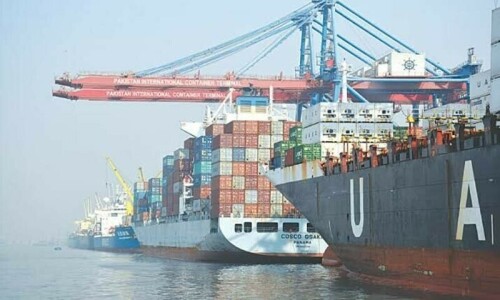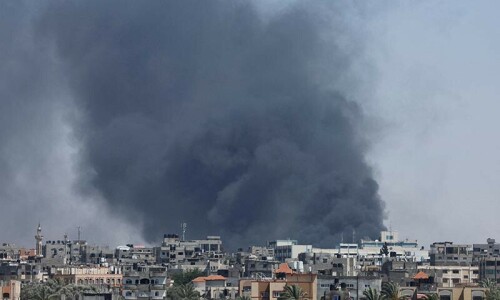
FEDERAL Minister for Food Security Sikandar Hayat Khan Bosan has been quite vocal in supporting farm subsidies to enable farmers to cut their cost of production and to make farming a profitable business.
He says farmers in Pakistan need a level-playing field to compete with their international peers. They need high quality seeds and their cost of inputs to be lowered.
His demand is not unjustified as many countries are providing huge support to their farmers. A new study by the Brookings Institution released on October 16 reveals that rich nations are now spending $250bn annually to subsidise their agricultural sectors.
This support enables them to artificially lower prices of some crops and block primary produce from developing countries to access their market. They spend 20 times more on farm subsidies than the $12bn they allocate for food aid and support for poor farmers annually.
Japan spends 59 times as much on supporting its own farmers as it does on food aid and nutrition support, while countries in the European Union spend 42 times and the United States 16 times. Some OECD countries give subsidies in the form of direct payments to farmers or create trade barriers to food imports from poor countries.
A group of 46 developing countries has introduced a proposal at the WTO to change the rules and allow them to invest in agriculture for domestic food security purposes
Speaking at a World Food Day event, Bosan said the challenges facing Pakistan’s agriculture sector have reached dangerous proportions. The government, he said, would fast-track the implementation of the agricultural relief package, which was blocked on a court order but had then been restored. The package aims to reduce the cost of agricultural inputs and compensate rice and cotton growers for losses in the wake of a slump in their international prices.
But the minister finds the package insufficient to properly meet the agriculture sector’s needs.
Meanwhile, the prices of farm commodities have declined and this is being seen as a bad omen for the sector. Pointing out the weaknesses in agricultural governance, a top ministry official says that either institutions have not been created or those already created lack good governance. And investment in rural areas is more important than in urban areas.
The prices of agricultural inputs had reportedly increased sharply during recent years. High prices tend to discourage the use of fertilisers, pesticides and quality seeds in optimal quantity, negatively impacting per-acre yield. In India, fertiliser subsidies have surged over the past five years. In Pakistan, the fertiliser industry is being provided gas at a relatively lower rate as a form of subsidy.
According to a notification issued by the food ministry on October 15, the federal government announced a one-time subsidy on fertilisers which will be paid at the rate of Rs500 per 50kg bag of DAP and at Rs217 per 50kg bag of NP and NPK fertilisers. The facility will continue till the pledged amount of Rs20bn is spent. The government’s decision will benefit the farmers who are preparing their soil for sowing wheat, which has to be completed by November 15.
The global rules set under the World Trade Organisation (WTO) regime that govern agriculture are seen as highly unfair. The Agreement on Agriculture, finalised in 1994, ruled that agricultural subsidies would be capped at their then-current level, and should be subject to gradual reduction.
At that time, the rich countries were subsidising their farm production while the developing countries, by and large, were either too poor to subsidise or were restrained by the IMF or the World Bank.
The developing countries, it was argued, would be better off by producing cash crops like coffee or sugarcane for export and then buying food in the global market at rates that would be cheaper than what it would cost them to grow the produce at home. But things did not work out that way. Many countries producing the same commodity led to oversupplies, which brought down prices.
The WTO’s rules do not allow developing countries that were not subsidising in 1994 to subsidise beyond the de minimis (Latin for ‘very minimum’) amount allowed to all WTO members. But the United States and Europe are allowed tens of billions of dollars a year in overtly trade-distorting subsidies for export products. They have yet to abolish the subsidies after agreeing to do so nearly 10 years ago.
Meanwhile, a group of 46 developing countries has introduced a proposal at the WTO to change the rules and allow them to invest in agriculture for domestic food security purposes.
Published in Dawn, Business & Finance weekly, October 26th , 2015
On a mobile phone? Get the Dawn Mobile App: Apple Store | Google Play













































Dear visitor, the comments section is undergoing an overhaul and will return soon.